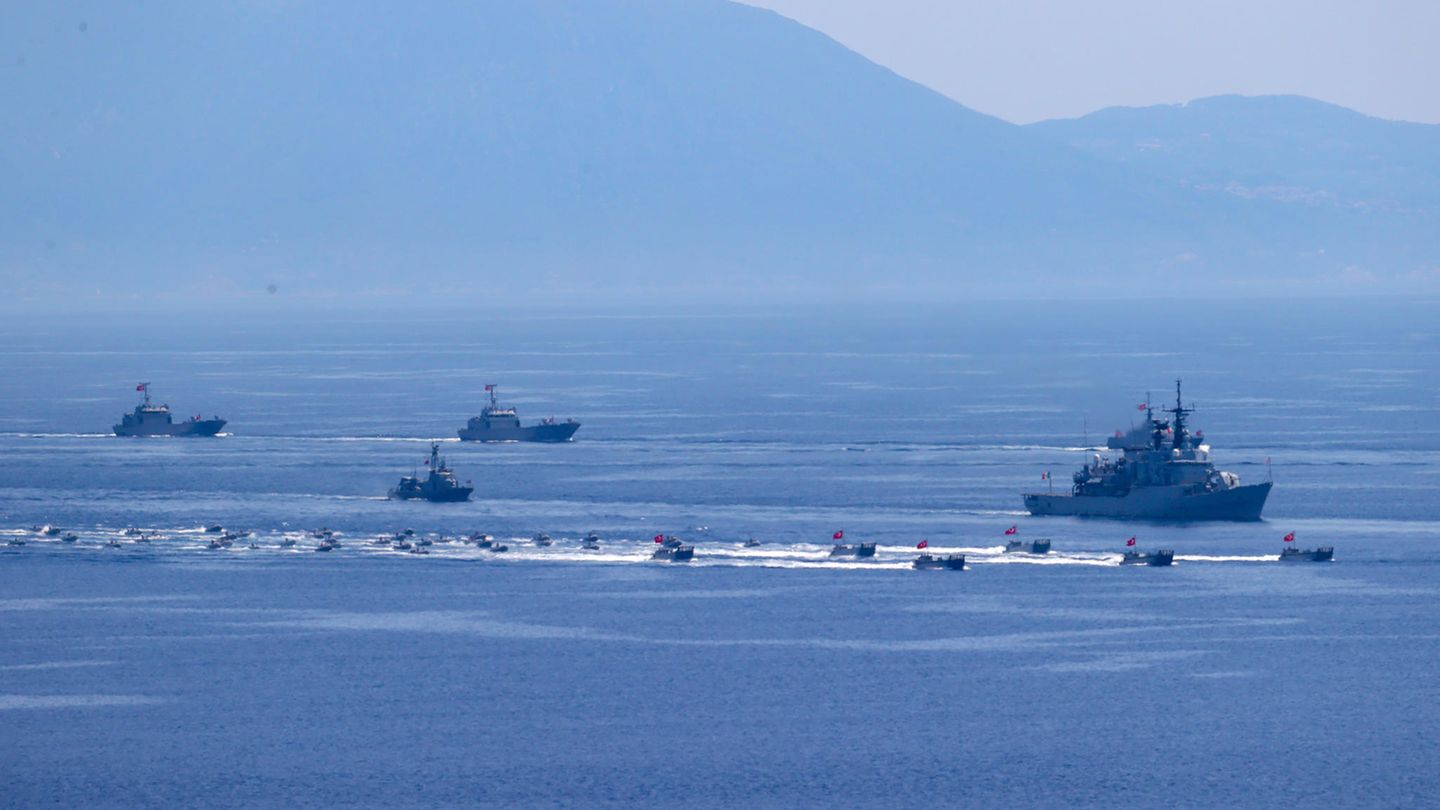Turkey has its sights set on the Greek islands in the Aegean and openly threatens Greece with an escalation. Now Turkish media are heating up the tensions. On Turkish television, the scenario is being played out of attributing a number of islands to Turkey.
During a discussion about the national borders of the two countries in a television program on the private channel “Haber Turk”, exactly the topic that has been a thorn in Turkey’s side for a long time came up: the Greek islands.
On a map, the journalist Gürkan Zengin placed a pointer on the extreme western tip of the Turkish mainland and held it perpendicular to the map. He probably wanted to show that various Greek islands, including Lesbos, Kos and Rhodes, should belong to Turkey, provided they are no further in the sea than the western tip of Turkey.
Other Turkish media are also heating up the topic. “A few of the islands that Turkey can lay claim to because of its militarization are Rhodes, Chios and Lesbos,” the Turkish daily Milliyet recently wrote, according to Greek media. The Turkish daily Yeni Safak reported that 22 of 23 Greek islands were militarized, which posed “a threat”. Accordingly, Turkey has sovereignty over nine islands and Greece was only granted the right of use.
Turkey threatens Greece with war
The topic reflects the current point of contention between the two NATO member states: Turkey is demanding the demilitarization of the islands and is even making claims on them, while Greece is insisting on its sovereignty. Although the island dispute has been going on for years, Turkey is now publicly questioning the sovereignty of its neighboring country.
The tone of the Turkish government is increasingly hardened. In a speech last Sunday, Turkey’s President Recep Tayyip Erdogan threatened Greek Prime Minister Kyriakos Mitsotakis: “As your ancestors this (Mitsotakis is said to have spoken to the US against Turkey when he left the US Congress May advised against selling F-16 fighter jets to Turkey) 100 years ago, you know what happened to them. Not that the same will happen to you. The price will be high.”
The provocative statement by the Turkish President was by no means an exception. After Mitsotakis visit to Washington, Erdogan said Mitsotakis no longer exists for him. And on Turkish state television, Erdogan has already threatened that the neighbors should “not indulge in dreams that they will regret.” That could have “catastrophic consequences” for Greece.
Turkey’s Defense Ministry even accuses Greece of fueling tensions between the two countries by using its islands in the eastern Aegean. According to the Turkish Defense Ministry, there have been 73 visits by state officials to the said islands since the beginning of the year, 24 of which were undertaken by Deputy Defense Minister Nikos Chardalias. As a result, a “violation of international law” was continued.
Hulusi Akar, Turkey’s defense minister, even banned Chardalias from visiting the Aegean islands, Greek media reported. According to a statement from the Turkish Defense Ministry, the Greek Deputy Defense Minister would have to request permission to visit the islands from now on.
Island membership contractually regulated
Even though many islands in the eastern Mediterranean are close to the Turkish coast, they are still officially part of Greece – and have been for around 100 years. The Treaties of Lausanne (1923) and Paris (1947) determine the affiliations of the individual islands. At the same time, certain islands must not be militarized. In 1936, the Treaty of Montreaux was signed, which is intended to partially replace the Treaty of Lausanne. Turkey invokes this, among other things, in its disputed territorial claims.
Athens, on the other hand, refers to the right of every state to self-defence, which is enshrined in the UN Charter. It justifies the militarization of the islands with the threat of numerous landing craft on the Turkish west coast.
Greece sees Turkey’s behavior as a clear threat of war, but is relying on “soberness, composure, determination,” according to government spokesman Giannis Oikonomou. Greece cannot be panicked, “but we have to be prepared for anything”.
Reasons could lie in the distraction of domestic political problems
It is considered unlikely that Turkey will actually start a war with Greece. Rather, they are likely to stick to their tactics of making the territorial claims clear through overflights of fighter planes and activities with ships. It was not until the end of April that Greek media reported a “record” with a total of 168 airspace violations by Turkish warplanes. Again and again they thunder in low flight over inhabited Greek islands.
Erdogan probably wants to distract from the domestic political problems, such as the difficult economic situation. In addition, there are presidential elections in Turkey next year, in which the Turkish President would like to stand again. For electoral success, he needs successes – albeit military ones.
Sources: , , , , ,
Source: Stern
David William is a talented author who has made a name for himself in the world of writing. He is a professional author who writes on a wide range of topics, from general interest to opinion news. David is currently working as a writer at 24 hours worlds where he brings his unique perspective and in-depth research to his articles, making them both informative and engaging.



